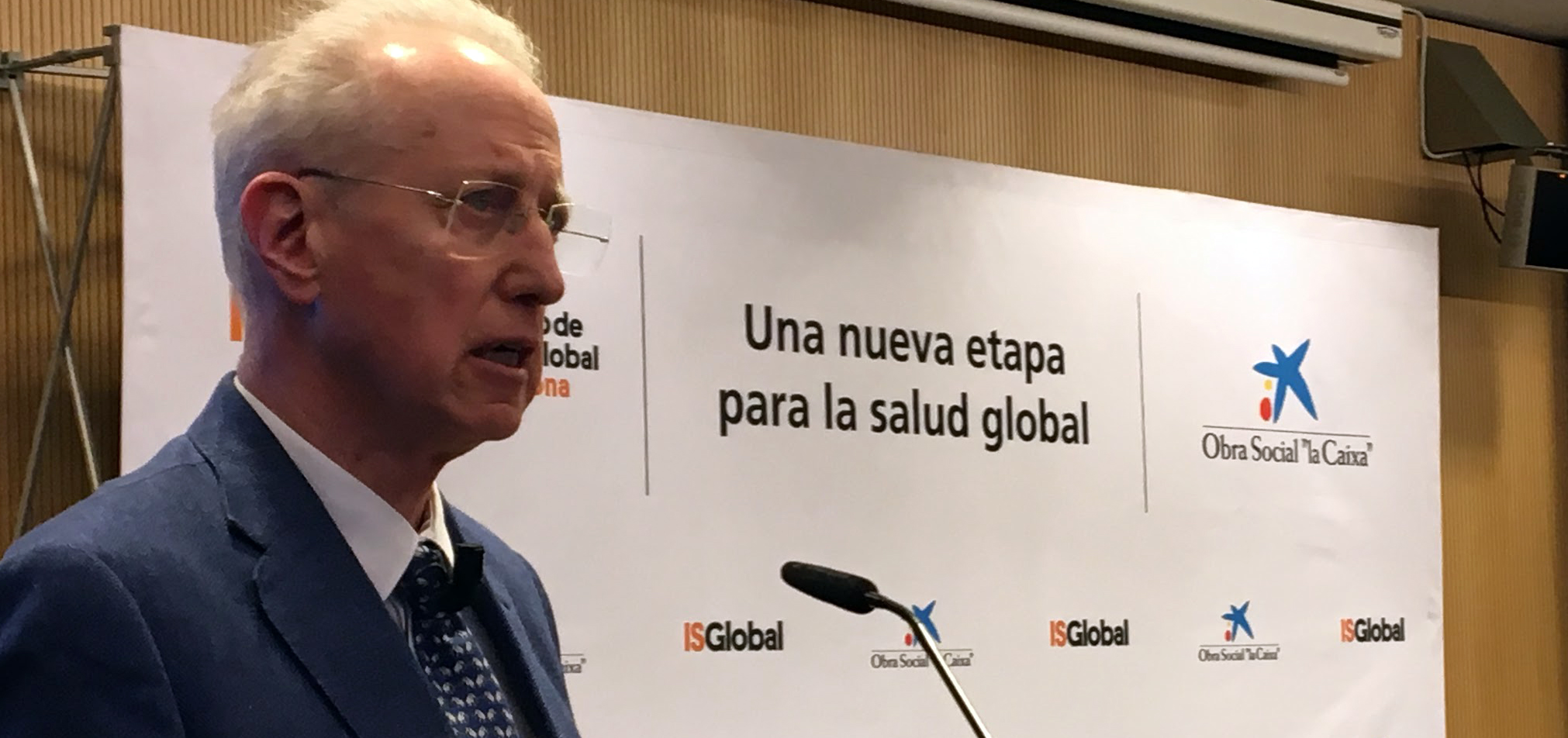ISGlobal Presents a New Chapter in its History after the Merger with CREAL
The key lecture was given by Sir Andrew Haines, who presented the new paradigm in global health: planetary health
16.02.2017
The new phase of ISGlobal was presented on February 14 at the Palau Macaya in Barcelona.
The event started with the welcome speech by the general director of the “la Caixa” Banking Foundation, Jaume Giró, who referred to the new stage of ISGlobal as “an exciting new challenge” that, upon the merger with CREAL, consolidates the institute as a “transdisciplinary leader in global health”.
Antoni Plasència, director general of ISGlobal, reviewed ISGlobal’s history since its creation as the first global health institute in the country, its subsequent alliance with CREAL thanks to the vision of their respective directors, an admirable team work, and the support of the Catalan government and the “la Caixa” Banking Foundation, and the merger. The new ISGlobal strengthens its position as an “innovative model of public-private partnership whose main aim is to convert knowledge into a transformative tool that will help change the fact that nowadays the postal code still weighs more than the genetic code in determining a person’s life expectancy.
For ISGlobal’s scientific director and ex-director of CREAL, Josep M. Antó, the three main challenges in this new phase are promoting collaborations in and outside the house, increasing competitiveness while bearing in mind ethical and gender issues, and transforming the public and global health agenda to respond to challenges such as the epidemiological transition and climate change.
The health counselor for the Catalan Government, Antoni Comín, highlighted the role of social and environmental determinants in health, as well as the need to address inequalities. “The 18 km that separate Sant Cugat and Sant Adriá de Besós represent an 8-year difference in life expectancy”, he pointed out. ISGlobal “is in a position to have a strong impact on the fight against local and global inequities” he added.
Human health depends on the state of our ecosystems
Sir Andrew Haines, Chair of the Rockefeller-Lancet Commission on Planetary Health, explained why human health depends on the state of the planet’s ecosystems, giving data and examples of the unprecedented impact of human activities on the environment. “If we all lived like the average North American, we would need 5 planets to sustain us” he said. To come up with solutions, we will need imagination to find better ways to measure human progress, more knowledge on health and environment interactions, and a better implementation. He gave some examples of concrete actions: a 7% increase in clean energy investment could save 3 million lives only due to the reduction in air pollution. He expressed optimism about the future of planetary health, which will greatly depend on actions at the city level. He insisted that many of the solutions are within our reach and should be based on a redefinition of prosperity that focuses on improving the quality of life.
The lecture was followed by a debate, chaired by Patricia Fernandez de Lis, editor in chief of the science section in El País, with the participation of Sir Andrew Haines, Pedro Alonso, director of the WHO Global Malaria Programme, and Leonardo Simao, director of the Manhiça Foundation. They all agreed on the importance of generating and disseminating scientific evidence.
Finally, Javier Solana, president of ISGlobal’s executive commission, closed the event underlining two concepts inherent to the institution: the provision of global public goods, and strong public-private cooperation.
On ISGlobal’s model
The Barcelona Institute for Global Health (ISGlobal) is the result of a public-private alliance between “la Caixa” Foundation, academic and government institutions, with origins in the clinical (Hospital Clínic and Parc de Salut MAR) and academic (University of Barcelona and Universitat Pompeu Fabra) sectors. Its working model aims at the translation of the scientific knowledge it generates through the Training and Policy and Global Development departments. ISGlobal is member of the CERCA Programme of the Catalan Government.
For more information:
Health cannot be approached other than at the global level
#ISGlobalLaCaixa


